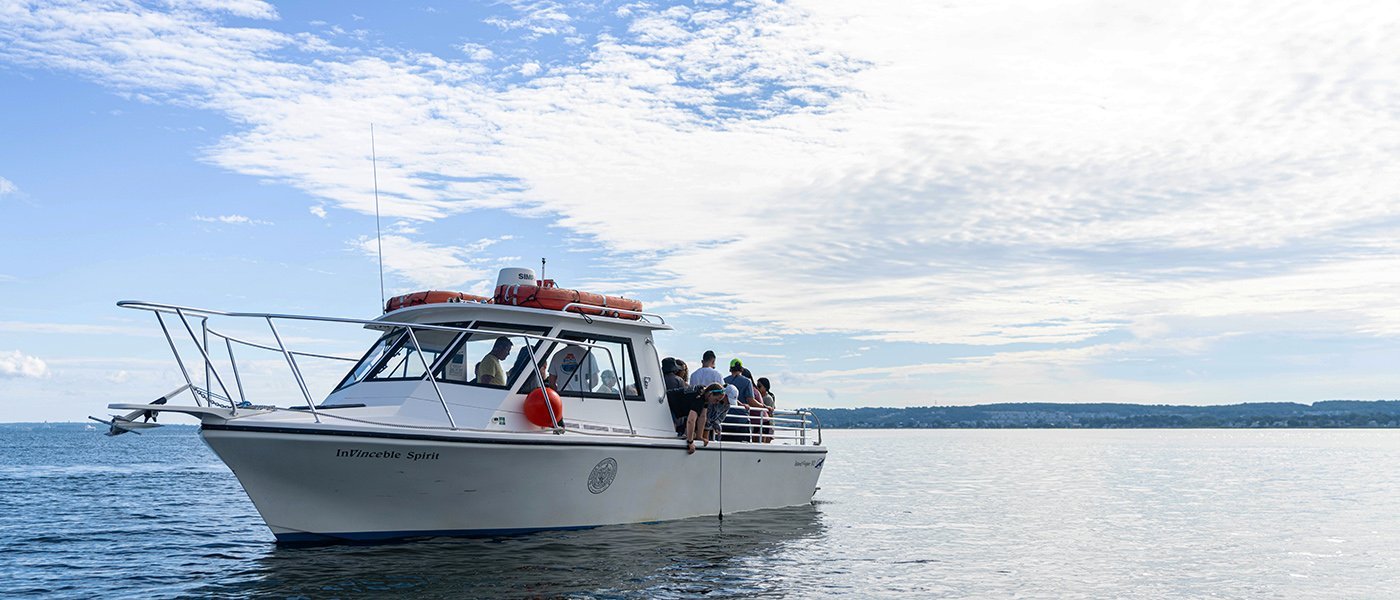Marine Biology
Dive in! With direct access to the coastal environment, Marine Biology students can dive headfirst into the study of oceanography, marine ecology, fisheries biology, and more with hands-on, interdisciplinary training from expert faculty.
This major is coordinated by the Department of Biology, Marine Biology, and Environmental Science.
Marine Biology Expert Researches Ornamental Fishing Trade
When the Associated Press investigated the global trade and the illegal practices sometimes used to catch ornamental fish, they turned to the leading expert on marine fish aquaculture, Andrew Rhyne, RWU professor of Marine Biology and aquarium research scientist, to explain the murky waters surrounding the ornamental fishing trade.
Watch a video of Andrew Rhyne explaining his work on the Associated Press website.
Learning Right on the Water
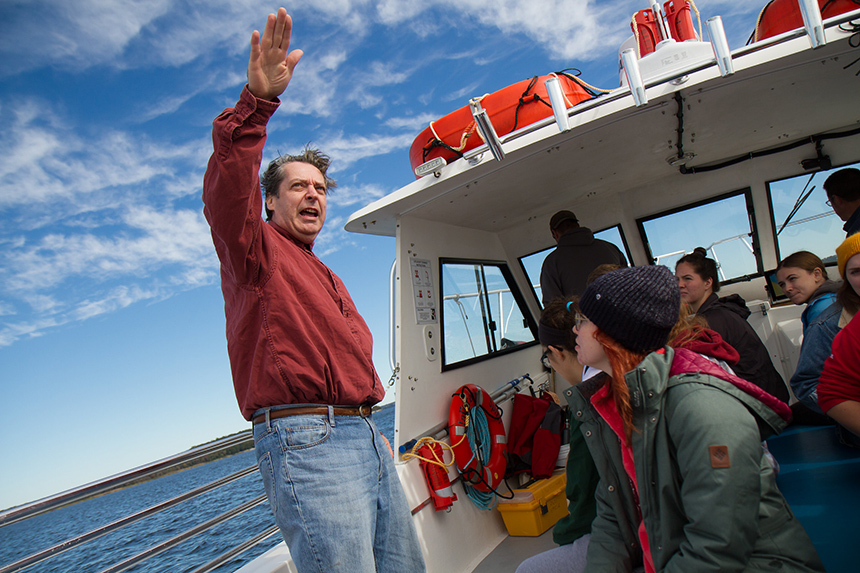
The Rhode Island coast is an outstanding location for marine science education. Students have many opportunities to go into tidal areas along our beautiful coastline, and into the depths of Mount Hope Bay and Narragansett Bay. There they can directly experience our coastal ecosystem dynamics, including intertidal, tidal pool, salt pond, and barrier beach habitats, on the bay right on campus.
As part of a unique hands-on experience, an entire class can be taken on board RWU's experiential learning research vessel, the InVinceable Spirit, a 30-foot craft that's outfitted with cutting-edge coastal research equipment.
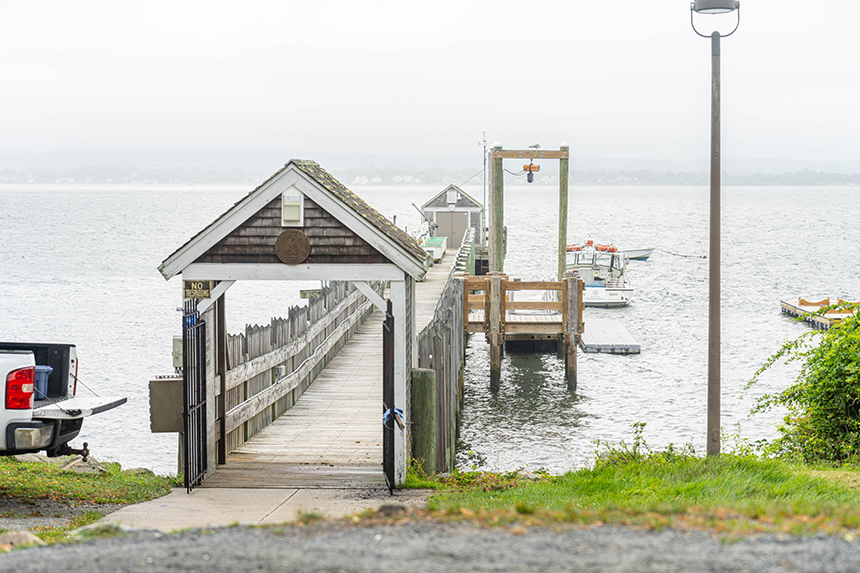
Extending 200 feet into Mount Hope Bay, RWU's Learning Platform provides students with direct access to the bay for water sampling and biological collecting. Used by classes and for research, the Learning Platform is also the launch site for the InVinceable Spirit. An upweller system for oysters and other bivalves is maintained there as well, for research by RWU's Shellfish Program.
Success By the Numbers

Real World Opportunities
Marine Biology students participate in community-engaged projects and internships during their undergraduate studies, not to mention attending classes held on our boat in the Mt. Hope Bay!

Hands-On Research
Annually there are over 80 students conducting research with faculty or caring for marine animals in our wet labs. Students are encouraged to participate in research opportunities starting in their first year.

Placement of 2022 Grads
Our 2022 graduates found success in employment or graduate school within 6 months of graduation.
Degree Requirements
Marine Biology, B.S.
Biology and Marine Biology majors investigate the interconnected processes that shape the living world. The Department of Biology and Marine Biology is housed in the Marine and Natural Sciences building, offering modern teaching and research laboratories, a spacious wet-lab with running seawater, several greenhouses and state-of-the-art instrumentation for cell and molecular biology. The Department offers the Bachelor of Science and Bachelor of Arts degrees in biology and marine biology. Minors are also offered in biology, marine biology and aquaculture and aquarium science. The Department has a very active program for undergraduate research, and students are encouraged to join an ongoing project as early as their first year.
Marine Biology
Marine Biology majors explore the unique challenges faced by organisms living in the marine environment and the methods by which they meet these challenges. Additionally, students in the major learn to apply this knowledge to confront current issues in marine science such as fisheries and resource management, aquaculture, and marine conservation. Students begin the program by obtaining a broad understanding of marine biology and oceanographic principles, and through subsequent lectures, laboratories, and field work, build on this knowledge for a more complete appreciation of the aquatic world. The department also fosters undergraduate research programs in such fields as biological oceanography, coastal and wetland studies, marine environmental physiology, and marine biotechnology and aquaculture in order to enhance the educational experience provided to undergraduates. Upon completion of the degree, students are prepared to specialize at the graduate level in the oceanographic sciences or other environmental disciplines.
Students may also elect to undertake a SEA Semester through the SEA Education Association (SEA) of Woods Hole, Massachusetts or a semester in Bermuda at the Bermuda Institute of Ocean Sciences (BIOS).
Program Requirements
Students who declare biology and marine biology must achieve a minimum average grade of C- for
Required Courses
The Marine Biology Major (B.S.)
Marine Biology majors can receive either a Bachelor of Arts (B.A.) or Bachelor of Science (B.S.) degree. Marine Biology majors must satisfy all University General Education Curriculum requirements and the College speech requirement,
- BIO 104 - Intro to Evolution & Ecology w/ Lab
- BIO 103 - Intro to Molec & Cell Biology w/ Lab
- BIO 200 - Genetics
- BIO 204 - Introduction to Marine Biology
- CHEM 191 - Principles of Chemistry I and Lab
- or
- CHEM 184 - College Chemistry I
- and
- CHEM 185 - College Chemistry II
- CHEM 192 - Principles of Chemistry II and Lab
- or
- CHEM 186 - College Chemistry III
- CHEM 301 - Organic Chemistry I and Lab
- ENVS 104 - Principles of Oceanography and Lab
- PHYS 201 - Physics I with Calculus and Lab
- PHYS 202 - Physics II with Calculus and Lab
- MATH 213 - Calculus I and Lab
- and either
- MATH 214 - Calculus II and Lab
- or
- MATH 218 - Applied Calculus for Life Sciences
- and either
- MATH 250 - Introduction to Biostatistics
- or
- MATH 315 - Probability and Statistics
- and one course from the following list:
- CHEM 201 - Environmental Chemistry I and Lab
- CHEM 202 - Environmental Chemistry II and Lab
- CHEM 302 - Organic Chemistry II and Lab
- CHEM 311 - Analytical Chemistry and Lab
- BIO 333 - Biochemistry for the Life Sciences
Elective Requirements
Students completing the Bachelor of Science (B.S.) in Marine Biology must also complete a minimum of 21 additional credits from among the following courses. Students must take at least one course from each of the Organismal 1, Organismal 2, and Applied and Molecular categories.
Organismal 1 (Heterotroph) Category
Students must take at least one course from the following list
Organismal 2 (Autotroph) Category
Students must take at least one course from the following list
Applied and Molecular Category
Students must take at least one course from the following list
- AQS 262 - Aquarium System Design and Life Support and Lab
- AQS 264 - Principles of Aquatic Animal Husbandry and Lab
- AQS 318 - Aquatic Animal Health and Lab
- AQS 346 - Principles of Hatchery Management and Lab
- BIO 312 - Conservation Biology
- BIO 332 - Fisheries Science
- BIO 340 - Biotechnology and Lab
- BIO 341 - Ecology of Marine Natural Products
- BIO 342 - Marine Microbial Ecology
- BIO 345 - Aquaculture
- BIO 370 - Virology and Lab
- BIO 392 - Animal Nutrition
- BIO 393 - Animal Nutrition Laboratory
- BIO 410 Research Diving Methods (no credit)
- ENVS 333 - Environmental Monitoring and Analysis and Lab
- ENVS 232 - Scientific Research Diving
- ENVS 301 - Marine Resource Management
- ENVS 401 - Environmental Toxicology and Lab
Supplemental Electives
These courses count towards the required 21 elective credits, but do not satisfy any category requirements. Note: Students may apply either BIO 231 or BIO 235 towards the major electives, but not both.
Restrictions
Students may only apply one short term study abroad course (
Students may only apply one research diving course (BIO 410 or
Students may apply either
Students may apply either
Students may apply either BIO 231 or BIO 235 towards the major electives, but not both.
Biology may not serve as a minor for a Marine Biology major.
The SEA Semester Option
Prerequisite for majors: Satisfactory completion of the writing and mathematics requirements and the five-course Interdisciplinary Core; a cumulative GPA of 2.5 or above; and permission from the program faculty.
Prerequisite for Core Concentration: Students who are not majoring in science or mathematics may use the SEA Semester to fulfill the Core Concentration requirement provided the following prerequisites are met before the SEA Semester: satisfactory completion of the writing, mathematics, and the five-course Interdisciplinary Core; a GPA of 2.5; and permission of the program faculty.
Students in good academic standing who meet the prerequisites may apply to attend a SEA Semester through the Sea Education Association (SEA) of Woods Hole, Massachusetts. This exciting and challenging off-campus program combines onshore classes, labs, and field work, in ocean sciences and maritime studies with an offshore sailing and research experience. Students attending a SEA Semester enroll in the following courses:
- BIO 411 - Applied Oceanography
- BIO 412 - Nautical Science
- BIO 414 - Maritime Studies
- BIO 416 - Marine Technology
- BIO 418 - Practical Oceanographic Research
Note:
Marine biology majors who successfully complete a SEA semester receive eight (8) credits towards the Applied and Molecular elective category.
This program is academically affiliated; however, certain restrictions exist for the transfer of institutional aid. Please consult the Spiegel Center for details.
Semester Program at the Bermuda Institute of Ocean Sciences (BIOS)
Prerequisite for majors: Satisfactory completion of the University Core Curriculum requirements and the five-course Interdisciplinary Courses.
This semester-long course of study examines the natural processes and human interventions found in the Gulf Stream, the Sargasso Sea, and the coral archipelago, Bermuda. Students are introduced to the interactions that determine the distribution and abundance patterns of tropical marine organisms, with emphasis on the ecology of near-shore areas. Basic principles of ecology are integrated with an understanding of the sea as a habitat for life. Major groups of dominant marine organisms of the region are examined in the field. Major near-shore marine habitats are examined, along with their associated biotic communities. Coral reef ecosystems are emphasized to illustrate basic concepts. Students conduct a major research project. Fall
Students enroll in the following courses:
- BIO 361 - Coral Reef Ecology
- BIO 336 - Tropical Marine Invertebrate Zoology
- BIO 410 - Research Diving Methods
- BIO 410 - Marine Biology Research
Marine Biology Internship at the New England Aquarium (NEAq)
Prerequisites: Satisfactory completion of the writing and mathematics requirements and the five course interdisciplinary CORE; a cumulative GPA of 2.8 or above; recommendation from a RWU Faculty member; and acceptance by the program faculty at the New England Aquarium (NEAq).
This semester-long course of study provides a rigorous introduction to the research and educational opportunities provided by a major public aquarium. The internship will consist of an active research component in a laboratory setting under the direction of an NEAq research scientist, an animal husbandry experience with responsibilities that may include feeding animals, cleaning tanks and equipment, and providing treatment for diseased animals, and the successful completion of a dedicated course of research under the direction of an RWU biology faculty member. Students enroll in the following courses:
Marine Biology, B.A.
Biology and Marine Biology majors investigate the interconnected processes that shape the living world. The Department of Biology and Marine Biology is housed in the Marine and Natural Sciences building, offering modern teaching and research laboratories, a spacious wet-lab with running seawater, several greenhouses and state-of-the-art instrumentation for cell and molecular biology. The Department offers the Bachelor of Science and Bachelor of Arts degrees in biology and marine biology. Minors are also offered in biology, marine biology and aquaculture and aquarium science. The Department has a very active program for undergraduate research, and students are encouraged to join an ongoing project as early as their first year.
Marine Biology
Marine Biology majors explore the unique challenges faced by organisms living in the marine environment and the methods by which they meet these challenges. Additionally, students in the major learn to apply this knowledge to confront current issues in marine science such as fisheries and resource management, aquaculture, and marine conservation. Students begin the program by obtaining a broad understanding of marine biology and oceanographic principles, and through subsequent lectures, laboratories, and field work, build on this knowledge for a more complete appreciation of the aquatic world. The department also fosters undergraduate research programs in such fields as biological oceanography, coastal and wetland studies, marine environmental physiology, and marine biotechnology and aquaculture in order to enhance the educational experience provided to undergraduates. Upon completion of the degree, students are prepared to specialize at the graduate level in the oceanographic sciences or other environmental disciplines.
Students may also elect to undertake a SEA Semester through the SEA Education Association (SEA) of Woods Hole, Massachusetts or a semester in Bermuda at the Bermuda Institute of Ocean Sciences (BIOS).
Program Requirements
Students who declare biology and marine biology must achieve a minimum average grade of C- for
Required Courses
The Marine Biology Major
Marine Biology majors can receive either a Bachelor of Arts (B.A.) or Bachelor of Science (B.S.) degree. Marine Biology majors must satisfy all University General Education Curriculum requirements and the College speech requirement,
- BIO 104 - Intro to Evolution & Ecology w/ Lab
- BIO 103 - Intro to Molec & Cell Biology w/ Lab
- BIO 200 - Genetics
- BIO 204 - Introduction to Marine Biology
- MATH 136 - Precalculus
- CHEM 191 - Principles of Chemistry I and Lab
- or
- CHEM 184 - College Chemistry I
- and
- CHEM 185 - College Chemistry II
- CHEM 192 - Principles of Chemistry II and Lab
- or
- CHEM 186 - College Chemistry III
- CHEM 301 - Organic Chemistry I and Lab
- ENVS 104 - Principles of Oceanography and Lab
- PHYS 109 - Physics I - Algebra based and Lab
- PHYS 110 - Physics II - Algebra-Based and Lab
and one course from:
- MATH 124 - Basic Statistics
- MATH 250 - Introduction to Biostatistics
- MATH 315 - Probability and Statistics
Elective Requirements
Students completing the Bachelor of Arts (B.A.) in Marine Biology must also complete a minimum of 28 additional credits from among the following courses. Students must take at least one course from each of the Organismal 1, Organismal 2, and the Applied and Molecular categories.
Organismal 1 (Heterotroph) Category
Students must take at least one course from the following list:
Organismal 2 (Autotroph) Category
Students must take at least one course from the following list:
Applied and Molecular Category
Students must take at least one course from the following list
- AQS 262 - Aquarium System Design and Life Support and Lab
- AQS 264 - Principles of Aquatic Animal Husbandry and Lab
- AQS 318 - Aquatic Animal Health and Lab
- AQS 346 - Principles of Hatchery Management and Lab
- BIO 312 - Conservation Biology
- BIO 332 - Fisheries Science
- BIO 340 - Biotechnology and Lab
- BIO 341 - Ecology of Marine Natural Products
- BIO 342 - Marine Microbial Ecology
- BIO 345 - Aquaculture
- BIO 370 - Virology and Lab
- BIO 392 - Animal Nutrition
- BIO 393 - Animal Nutrition Laboratory
- BIO.410 Research Diving Methods
- ENVS 232 - Scientific Research Diving
- ENVS 301 - Marine Resource Management
- ENVS 333 - Environmental Monitoring and Analysis and Lab
- ENVS 401 - Environmental Toxicology and Lab
Supplemental Electives
These courses count towards the required 28 elective credits, but do not satisfy any category requirements. Note: Students may apply either BIO 231 or BIO 235 towards the major electives, but not both.
- BIO 305 - Neotropical Marine Biology
- BIO 310 - Tropical Ecology
- BIO 315 - Animal Physiology and Lab
- BIO 320 - Marine Ecology and Lab
- BIO 361 - Coral Reef Ecology
- BIO 231 - Bioethics: Life, Health and Environment
- or
- BIO 235 - Biological Illustration
Restrictions
Students may only apply one short term study abroad course (
Students may only apply one research diving course (BIO 410 or
Students may apply either
Students may apply either
Students may apply either BIO 231 or BIO 235 towards the major electives, but not both.
Biology may not serve as a minor for a Marine Biology major.
The SEA Semester Option
Prerequisite for majors: Satisfactory completion of the writing and mathematics requirements and the five-course Interdisciplinary Core; a cumulative GPA of 2.5 or above; and permission from the program faculty.
Prerequisite for Core Concentration: Students who are not majoring in science or mathematics may use the SEA Semester to fulfill the Core Concentration requirement provided the following prerequisites are met before the SEA Semester: satisfactory completion of the writing, mathematics, and the five-course Interdisciplinary Core; a GPA of 2.5; and permission of the program faculty.
Students in good academic standing who meet the prerequisites may apply to attend a SEA Semester through the Sea Education Association (SEA) of Woods Hole, Massachusetts. This exciting and challenging off-campus program combines onshore classes, labs, and field work, in ocean sciences and maritime studies with an offshore sailing and research experience. Students attending a SEA Semester enroll in the following courses:
- BIO 411 - Applied Oceanography
- BIO 412 - Nautical Science
- BIO 414 - Maritime Studies
- BIO 416 - Marine Technology
- BIO 418 - Practical Oceanographic Research
Note:
Marine biology majors who successfully complete a SEA semester receive eight (8) credits towards the Applied and Molecular elective category.
This program is academically affiliated; however, certain restrictions exist for the transfer of institutional aid. Please consult the Spiegel Center for details.
Semester Program at the Bermuda Institute of Ocean Sciences (BIOS)
Prerequisite for majors: Satisfactory completion of the University Core Curriculum requirements and the five-course Interdisciplinary Courses.
This semester-long course of study examines the natural processes and human interventions found in the Gulf Stream, the Sargasso Sea, and the coral archipelago, Bermuda. Students are introduced to the interactions that determine the distribution and abundance patterns of tropical marine organisms, with emphasis on the ecology of near-shore areas. Basic principles of ecology are integrated with an understanding of the sea as a habitat for life. Major groups of dominant marine organisms of the region are examined in the field. Major near-shore marine habitats are examined, along with their associated biotic communities. Coral reef ecosystems are emphasized to illustrate basic concepts. Students conduct a major research project. Fall
Students enroll in the following courses:
- BIO 361 - Coral Reef Ecology
- BIO 336 - Tropical Marine Invertebrate Zoology
- BIO 410 - Research Diving Methods
- BIO 410 - Marine Biology Research
Note:
Marine Biology Internship at the New England Aquarium (NEAq)
Prerequisites: Satisfactory completion of the writing and mathematics requirements and the five course interdisciplinary CORE; a cumulative GPA of 2.8 or above; recommendation from a RWU Faculty member; and acceptance by the program faculty at the New England Aquarium (NEAq).
This semester-long course of study provides a rigorous introduction to the research and educational opportunities provided by a major public aquarium. The internship will consist of an active research component in a laboratory setting under the direction of an NEAq research scientist, an animal husbandry experience with responsibilities that may include feeding animals, cleaning tanks and equipment, and providing treatment for diseased animals, and the successful completion of a dedicated course of research under the direction of an RWU biology faculty member. Students enroll in the following courses:
Marine Biology Minor
Program Requirements
Required Courses
- BIO 103 - Intro to Molec & Cell Biology w/ Lab
- or
- BIO 104 - Intro to Evolution & Ecology w/ Lab
- and
- BIO 204 - Introduction to Marine Biology
- ENVS 104 - Principles of Oceanography and Lab
- And a minimum of 8 additional credits taken from the Applied or Organismal categories of marine biology courses.
Note:
Biology may not serve as a minor for a Marine Biology major and Marine Biology may not serve as a minor for a Biology major.
Marine Biology learning outcomes:
Explain and synthesize marine science concepts, including biological and oceanographic principles, relevant to interpreting the biodiversity and ecology of marine systems.
Develop questions and hypotheses, and conduct experimental, field-based and descriptive research in basic, applied and interdisciplinary sciences
Use data, scientific literature, and evidence-based reasoning to analyze biological and environmental systems across spatial and temporal scales
Communicate scientific information verbally, in writing, and visually to diverse audiences including scientists and non-scientists
Discuss interactions between science and society, including human-environment relationships, ethical aspects of scientific research, and using evidence-based decision-making to propose solutions to important issues in society.
Apply their knowledge and scientific competencies to their own personal and professional development, and to engage in their communities.
State-of-the-Art Facilities
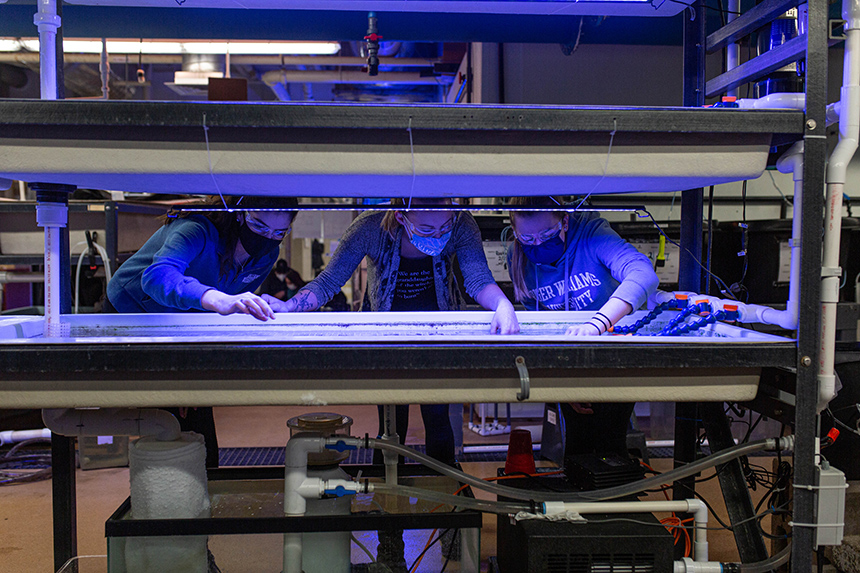
With saltwater drawn straight from the bay, our shellfish hatchery and tropical fish aquaculture facility provide opportunities to pioneer research and technology development alongside faculty members. The Marine and Natural Sciences building is equipped with a Wet Lab, Shellfish Hatchery and Farm, Aquatic Diagnostic Laboratory, and a greenhouse. The Marine Biology Wet Lab, a 3,000-square-foot state-of-the-art research space, houses many undergraduate and faculty research projects as well as most of the RWU aquaculture projects, and offers many research and work-study opportunities for students. MNS houses advanced laboratory resources, including a confocal laser microscope, an epifluorescence microscope, a flow cytometer, a particle counter, thermal cyclers, controlled environmental chambers, and analytical chemistry instrumentation.
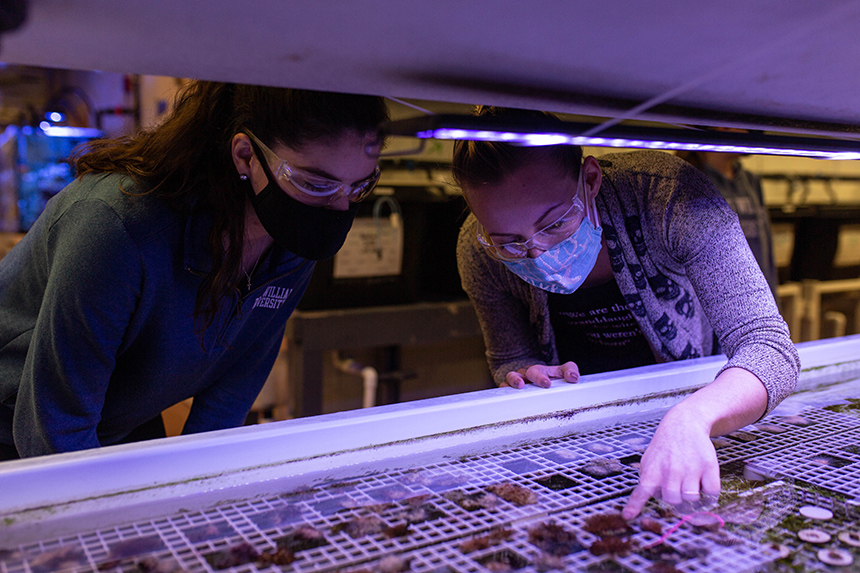
Learn from Faculty Experts
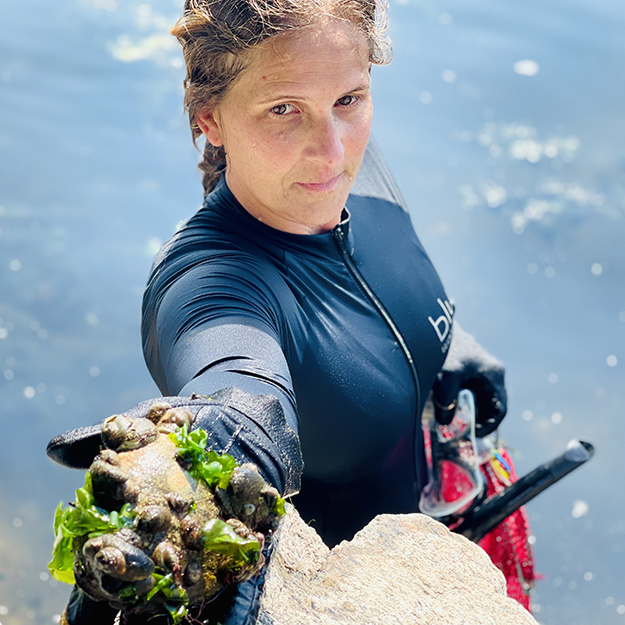 Koty Sharp, Ph.D.
Koty Sharp, Ph.D.
Associate Professor, Biology, Marine Biology, & Environmental Science
Koty Sharp is known for her work to save coral reefs worldwide through her research on local coral, which recently became Rhode Island’s official state coral thanks to her efforts.
“In my research lab, we are interested in how interactions with microbes, both beneficial and pathogenic, impact the fitness and survival of benthic marine invertebrates. This is especially important as marine species, communities, and ecosystems face the emerging threats of climate change. Much of our work is focused on the temperate coral Astrangia poculata, an emerging model for studying coral-microbe symbiosis and physiology. All of the members of the Sharp Lab team have the opportunity to get hands-on experience with laboratory and field research during the academic year and throughout the summer months.”
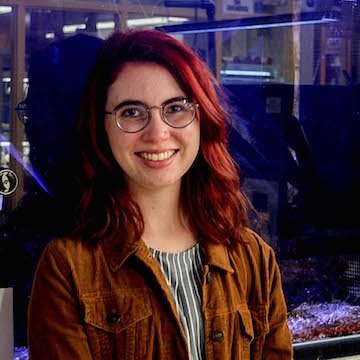
From Research Scientist to App Developer
Gabrielle Baillargeon, RWU Class of 2020Ever since forging an original research project her freshman year, Gabrielle Baillargeon continues to surf a tidal wave of success.
Read full storyAlumni Share Their Experiences
"I got research experience as a freshman, which I wouldn't have gotten anywhere else. I had so much lab time and time personally with my mentors and professors that helped me gain a lot of confidence and independence in the lab. Getting a job and setting myself up for the future is a direct result of going to RWU."
Hannah Sterling '22
Research Technician at Bigelow Laboratory for Ocean Sciences in East Boothbay, Maine
“Something so unique to Roger is we get to be super hands-on in our research as undergraduates. Being able to take part in world-class research is absolutely amazing. It’s definitely a highlight of Roger.”
Tommy DeMarco '21
Penguin Trainer II at the New England Aquarium in Boston
"I did undergraduate research looking at a specific kind of jellyfish that create currents in the water that bring food toward them when they swim. I looked at the speed of the currents they create, compared across species, and studied the fluid mechanics and how atoms move through water."
Malaika Cordiero '21
California Institute of Technology Ph.D. program in Bioengineering in Pasadena, Calif.
Opportunities for Extended Learning
Center For Economic and Environmental Development
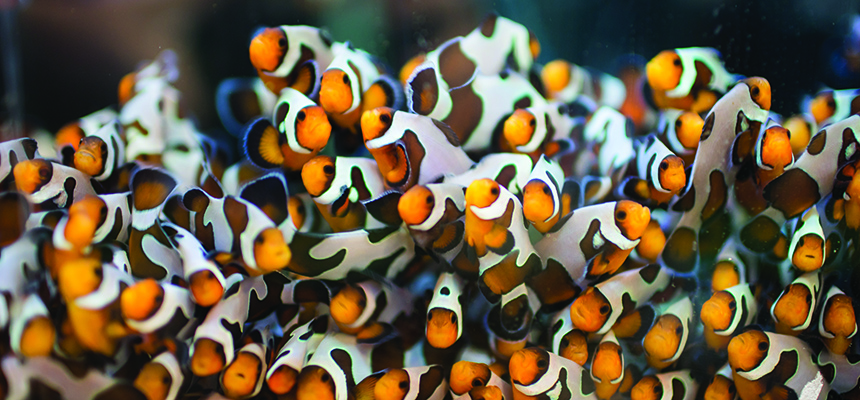
As part of RWU’s emphasis on the Blue Economy at a local, regional, national, and global level, the Center for Economic and Environmental Development (CEED) focuses on collaborative marine research, industry support, marine education, public outreach, engagement, and extension. CEED addresses critical challenges facing human health and the coastal environment through education, research, outreach, and training. In CEED's research and student training, they extend the university’s educational resources by working with members of the coastal community to identify important marine resource issues, conduct applied scientific research in these areas, and share findings with stakeholders in the community, including federal and state agencies, nonprofits, local businesses and many other members of the community. The work of CEED currently focuses on four main program areas: Shellfish Program, Aquarium Science and Aquaculture, Aquatic Diagnostic Laboratory, and Temperate Coral Propagation and Microbial Ecology.
Narragansett Bay Estuary Program
RWU is the hub of the Narragansett Bay Estuary Program (NBEP), which is dedicated to the protection and improvement of vast watersheds, rich in coastal wildlife habitat, economic opportunities and recreational assets. Marine Biology students have access to NBEP scientists and help develop solutions for complex problems facing the people and coastal ecosystems of our region.
Undergraduate Research Starts Your First Year
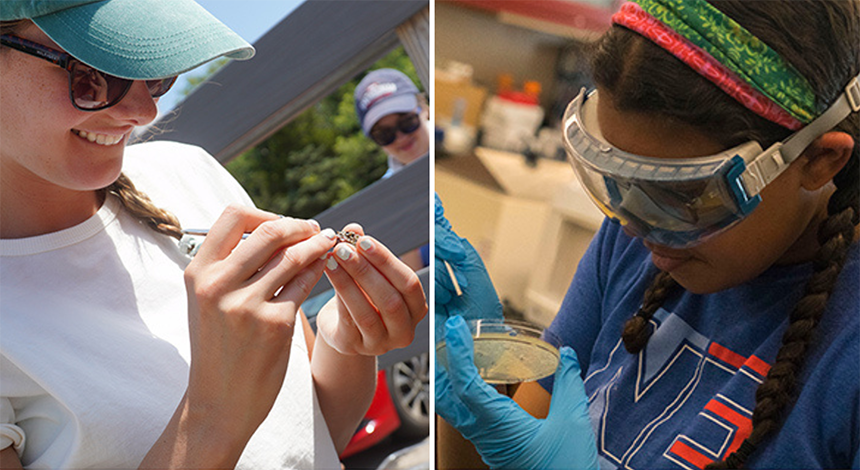
Marine Biology majors explore the unique challenges faced by organisms living in the marine environment and the methods by which they meet these challenges. Students begin by obtaining a broad understanding of oceanographic principles, and through subsequent lectures, laboratories and field work, build on this knowledge for a more complete appreciation of the aquatic world. Undergraduate research is integrated into the Marine Biology curriculum, with opportunities for students to earn academic credit for doing research starting in their first year. Students develop proposals and compete for small grants to fund their projects, and to present their findings at regional, national and international conferences.
Recent student research projects include:
- Functional morphology of jellyfish
- Evolution and ecology of marine viruses
- Ecology of temperate corals and their microbiome
- Diagnostics of marine fish and shellfish diseases
- Marine ornamental fish and invertebrate aquaculture
- Shellfish aquaculture, ecology, and larval biology
Prestigious Internships
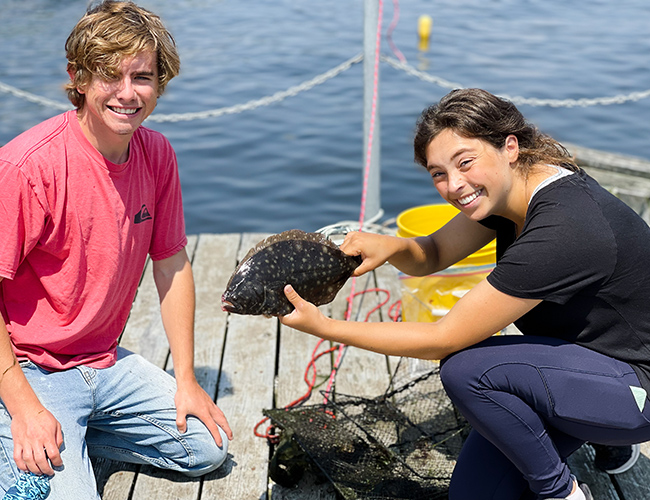 RWU students are prepared for highly competitive internships with leading marine and environmental research agencies and advocacy organizations. Our students have interned at organizations such as:
RWU students are prepared for highly competitive internships with leading marine and environmental research agencies and advocacy organizations. Our students have interned at organizations such as:
- New England, Mystic, & Baltimore Aquariums
- Save the Bay
- Audubon Society
- Center for Coastal Studies
- U.S. Environmental Protection Agency
- R.I. Department of Environmental Management
- Woods Hole Oceanographic Institution & Marine Biological Laboratory
To read more about our academic offerings, or to view full course descriptions, please refer to our University Catalog.
Marine Biology in the News

How to VOG: Students Create Unique Vertical Oyster Gardens on the RWU Waterfront
Florida-based Oyster Boys Conservation visited the Bristol campus to demonstrate their oyster gardens, capitalizing on the bivalves’ capacity to filter and improve water quality.
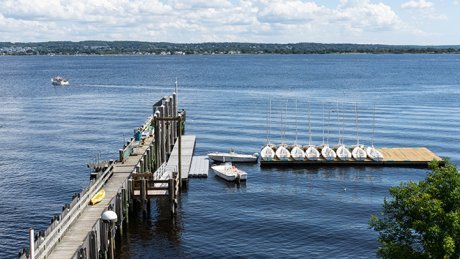
Rhode Island to Host First of its Kind Blue Economy Investment Summit at RWU
The community is invited to attend the first annual summit presented by Blue Venture on Jan. 24.

Astrangia Things: Professor’s Research on Hibernating Coral Could Help Tropical Populations
Undergraduate students in Professor Koty Sharp’s Marine Biology lab work on all phases of Astrangia research, from running experiments to co-authoring publications.
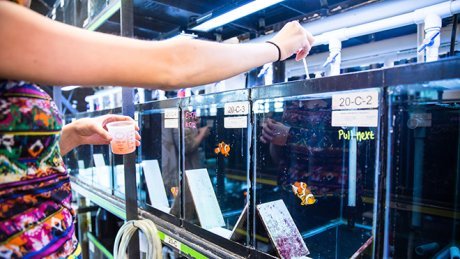
RWU and New England Aquarium Team Up to Advance Marine Fish Aquaculture and Conservation at U.S. Public Aquariums
With a $750,000 NOAA Sea Grant, NEAq and RWU lead initiative to catalyze sustainable breeding and raise awareness of aquaculture among public and commercial fishermen.

RWU Lets High School Students Dive into World of Marine Biology
“Students get exposed to our introductory curriculum,” said Professor Brian Wysor. “We want them to walk away with an appreciation for science.”


